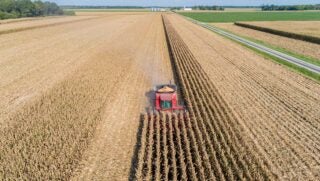By drawing on and supporting Native American farmers, the entire agricultural sector can benefit from the original agricultural practices used in North America.
For example, native practices can provide a much needed resource to address modern problems of water scarcity, volatile weather conditions, and crop resiliency. One commonly cited gardening example is the practice of three sister’s cropping, where corn, bean, and squash plants are grown together in a shared space.
American Farmland Trust (AFT) helps to nurture Native American growers through the Brighter Future Fund (BFF), which provides direct support to farmers and ranchers across the country, allowing them to grow their business and build a sustainable farming operation. The fund supports greater equity and opportunities for producers from socially disadvantaged or limited-resource communities.
Farmers of Native American descent or Indigenous identity have historically been subject to racial or ethnic prejudice, so expanding resources for this group is an essential way to retain their presence in the agricultural sector and ensure their success.
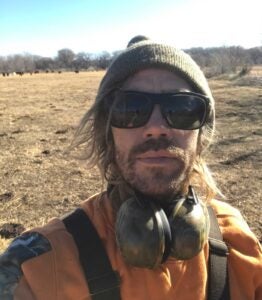
Sage Hagan of Tierra Sagrada Farms, a recipient of the 2023 Brighter Future Fund, brings his Native American values and practices to his business and hopes to build a more sustainable, thriving vision of agriculture in New Mexico.
Hagan, who identifies as an Alaskan Native and is an enrolled member of the Tlingit Nation, first began farming commercially in 2018. Originally trained as a professional chef, Hagan attended culinary school and fell in love with food because of how it brings people together.
Hagan recalled a moment where, when working as a chef in Paris, a box of apples was delivered to his kitchen.
“I took a bite out of that apple and it stopped me in my tracks — I just stopped and ate it, enjoying every bite,” he said.
As a chef, he knew that good food is rooted in good ingredients.
“The ability [of Parisians] to keep food quality high really spiked my interest, and I wanted to know, how were these apples grown? Who grew them?,” he said.
Eventually, because of the high stress environment that surrounds the culinary industry, Hagan became burned out with food service and moved back to his native New Mexico. Around this time, Hagan began seeing the Slow Food Movement gain traction. And his interest in it grew.
“There were lots of monetary roadblocks. … I didn’t have the money for tractors or any backing, so I decided to start with market gardening in permanent raised beds,” he said. “It was something I could do by hand, and I didn’t need tons of acreage.”
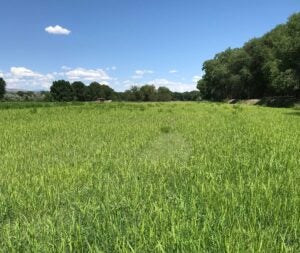
Hagan began his operations in the backyard of his home in 2017 in Bernalillo, New Mexico, and quickly expanded to raise meat chickens as well. Originally starting with 50 birds, Hagan was able to triple that number because of a neighbor lending him their land.
In 2020, Hagan moved his operations to 18 acres in Sile, where Tierra Sagrada Farms and Sile Pastures, a joint venture he owns and operates, are housed. Hagan moved his family to the farm in April 2023 and is hoping to expand the operations and cultivate a practical, successful entrepreneurship with the biodiverse irrigated acreage of Sile Pastures, while also giving back to his community through the nonprofit produce operation Tierra Sagrada Farms.
To ensure that his farm thrives, Hagan credits the support and help from his community.
“I’m a first-generation farmer … and I saw that as long as I was willing to reach out, ask for help, ask for mentors, I would be able to make it work,” said Hagan.
The supportive community is also how Hagan found out about AFT’s Brighter Future Fund. A client of his sent the link to him, and while he initially wasn’t sure if he would have the time to go through the application process and submit it, Hagan said he was pleasantly surprised at how straightforward it was.
“I thought it looked pretty self explanatory, pretty simple … and I feel so honored and excited” to have been selected for a grant, Hagan said.
Hagan’s operations have scaled up significantly from his original flock — today, his poultry production boasts some 1,500 Freedom Rangers and another 1,500 American Cornish Crosses, a heritage breed and a staple broiler bird respectively.
Tierra Sagrada also rears turkeys, and Hagan is expanding into beef, lamb, and pork production with Sile Pastures.
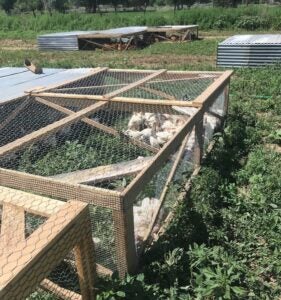
With the $10,000 he received through the Brighter Future Fund, Hagan hopes to purchase appropriate processing equipment to handle the higher production volume. Specifically, he hopes to upgrade the chicken tractors he uses. Hagan is interested in upgrading to prairie schooners from Featherman Equipment, which can quadruple the number of birds they can currently house in one tractor.
“The schooner is expensive and out of reach for us if not for the grant,” Hagan said.
Another possible upgrade for Hagan’s operations is the purchase of an ice maker, so the harvested chickens can be kept cold during the processing pipeline before they go into a freezer.
Whatever his investments, Hagan hopes to continue his passion to serve his community and provide nutritious, delicious food to others. As he says on his website, “We chose this agrarian lifestyle for the pursuit of regeneration and the pursuit of hard work… The Land is Sacred.”
By supporting his efforts, American Farmland Trust is ensuring that first-generation farmers, especially those of Native American descent, have the aid and resources they need to cultivate a thriving future for the agricultural sector.
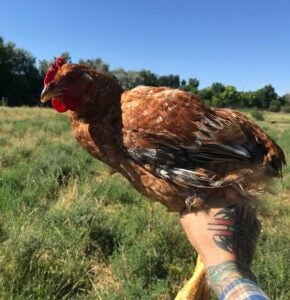
This article was published on AGDAILY on behalf of American Farmland Trust.
American Farmland Trust’s Brighter Future Fund provides grants to help farmers nationwide improve farm viability, access, transfer or permanently protect farmland, or adopt regenerative agricultural practices. In 2022, the fund began prioritizing funding for farmers who identify as BIPOC, Veterans, LGBTQIA+ and beginning farmers who had limited access to financial resources in the past. Since 2020, AFT, with the support of Tillamook, Tractor Supply, and others, has provided approximately $4.5 million in grants directly to more than 2,000 farmers nationwide. Learn more and contribute here.




